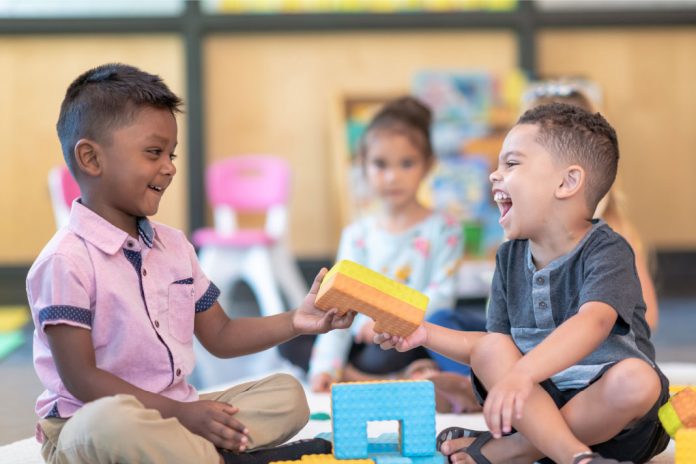Friendships are some of the most special relationships a person can have, and some of the most essential friendships a person can make are during their childhood. This month, Ouiam El Hassani tells you how to help your child be a good friend through playdates.
Navigating friendships is not always easy—and it certainly takes work to learn how to be a good friend. As a child grows and develops their social skills, it’s only natural that they will have a hard time sharing or may struggle to get along with another kid at some point or another. In the name of raising happy, kind and empathetic children, there are a few things that you can do to help your child be a good friend.
A huge part of learning to be a good friend is learning to compromise and share. Teach your child to be flexible by practicing at home with your family. Point out moments when you are flexible as you are playing with your little one. For example, rather than simply following their lead, you can also make requests. Try saying, “I want to use the purple ball.” At other times you can compromise and say something like: “OK, sure. I can be flexible and use the green ball instead.” Alternatively, ask your child to be flexible by saying: “Could you be flexible and use the green ball this time?” The same goes for sharing- ask your little one to share their toys to instill the quality.
Things never go quite as expected when it comes to children, which can make it really hard when your child first starts playing with other kids. They may have big feelings when things don’t go to plan. Children may react to the unexpected by getting upset. Should this happen, remember to validate their feelings first and help them work through those emotions in a productive way. This could be taking a break and a moment away from their friends—and that’s OK, too.
When it comes to playdates, try to:
Plan it for a good time of day- As your little one is beginning to have playdates and learning about being a friend, set them up to have a successful playdate by first choosing a calm time of day. Getting close to naptime is often tricky, and, if possible, try to avoid shifting a nap in favour of a playdate.
Meet at a neutral location- Sometimes it can be hard for your child to host other children in their space and share their toys. Try to meet at a neutral location.
Discuss how toy sharing works beforehand- If you are hosting the playdate, talk about sharing toys before the other children come over. With your child helping, set aside any special toys that your little one will have a very hard time sharing in a space where the other children can’t access them.
Set up structured activities: Some children really benefit from structure. You can build structure into the playdate by preplanning and setting up structured games and activities. This is a great tool for kids who have a hard time jumping in to play or struggle with self-regulation during playdates.
Remember, it will take your child some time to learn about being flexible and sharing when they first begin experiencing playdates. Guide them through it, and most importantly, teach them all you can about friendship.


































